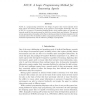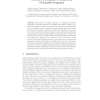2383 search results - page 163 / 477 » Anticipatory Behavioral Control |
JACIII
2006
13 years 9 months ago
2006
ct-oriented modules that create an abstract interface for a specific class of hardware or software components. If these components provide "intelligent" functions, the ov...
CORR
2004
Springer
13 years 9 months ago
2004
Springer
FLUX is a programming method for the design of agents that reason logically about their actions and sensor information in the presence of incomplete knowledge. The core of FLUX is...
BC
1998
13 years 8 months ago
1998
This paper presents a mathematical model for the learning of accurate human arm movements. Its main features are that the movement is the superposition of smooth submovements, the ...
ICCS
2009
Springer
14 years 3 months ago
2009
Springer
We present a modular approach to realizing fine-grained adaptation of program behavior in a parallel environment. Using a compositional framework based on function call intercepti...
ICRA
2008
IEEE
14 years 3 months ago
2008
IEEE
— In human and animal running spring-like leg behavior is found, and similar concepts have been demonstrated by various robotic systems in the past. In general, a spring-mass mod...


